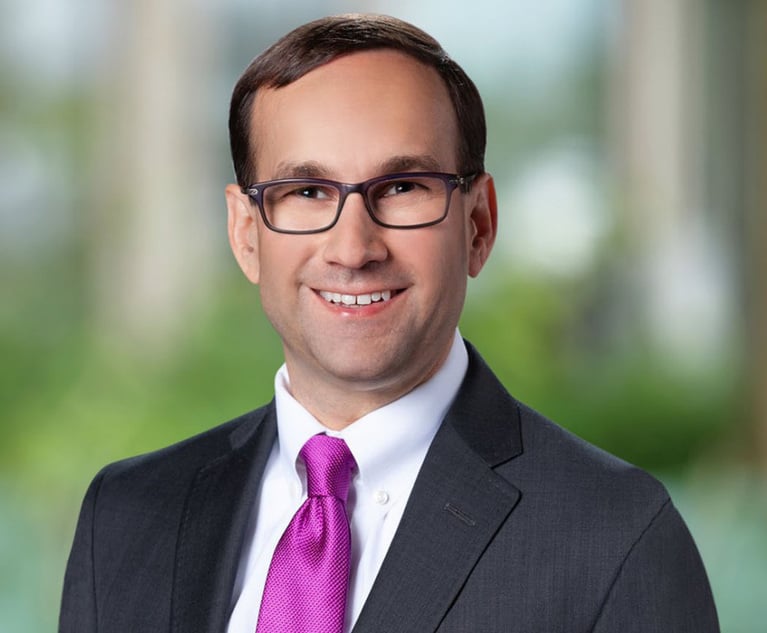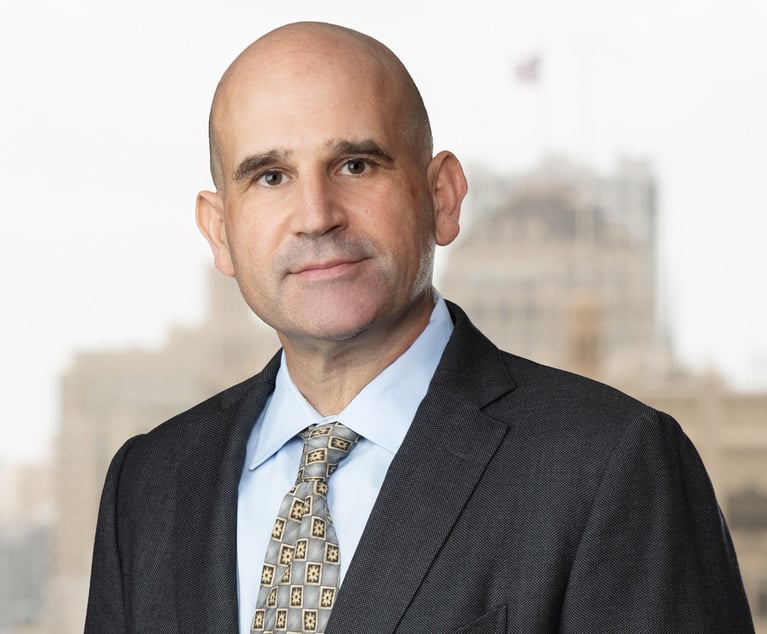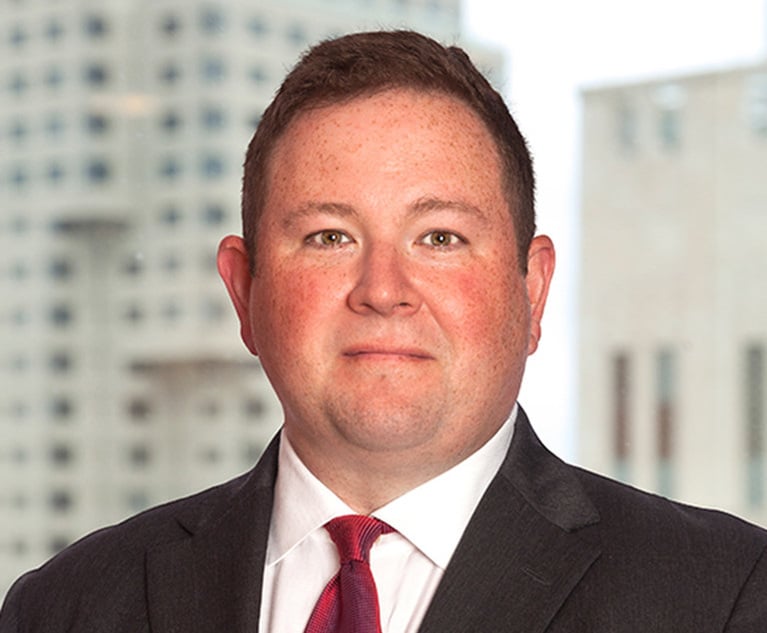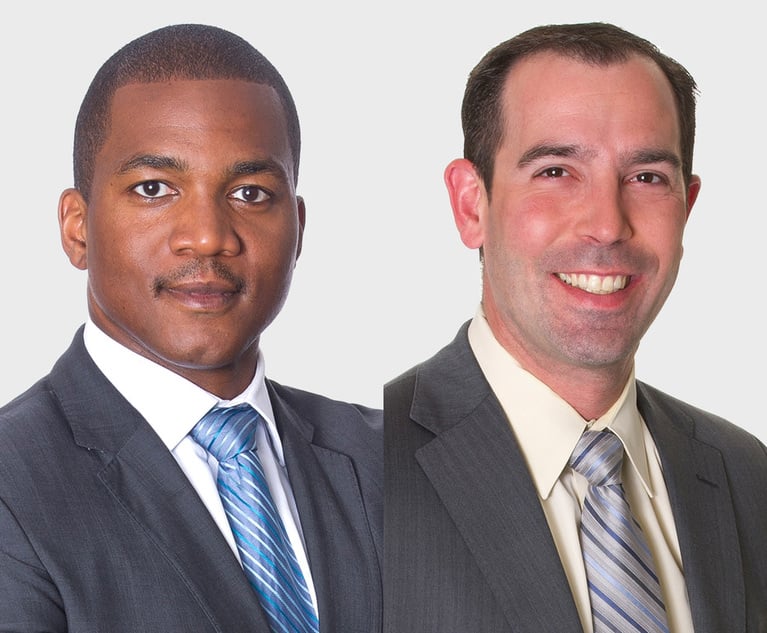 Debra Clements, chief administrative officer, general counsel and corporate secretary at Milliken.
Debra Clements, chief administrative officer, general counsel and corporate secretary at Milliken.Inside the Ethics and Compliance Program at Milliken: A Q&A With General Counsel Debra Clements
Debra Clements, chief administrative officer, general counsel and corporate secretary of the industrial manufacturer Milliken & Co., tells Corporate Counsel how the company is committed to ethics and compliance and the challenges in the ethics and compliance space.
January 07, 2020 at 02:38 PM
4 minute read
The original version of this story was published on Corporate Counsel
Debra Clements, chief administrative officer, general counsel and corporate secretary of the industrial manufacturer Milliken & Co., believes in having a robust ethics and compliance program, which has led to the company being named one of the World's Most Ethical Companies by the Ethisphere Institute for 13 consecutive years.
In an email, Clements told Corporate Counsel how the Spartanburg, South Carolina-based company is committed to ethics and compliance and the challenges in the ethics and compliance space. This conversation has been edited for length and clarity.
Corporate Counsel: Could you discuss the importance of having robust ethics and compliance programs?
Debra Clements: We celebrate our longtime commitment to ethics and compliance as embodied by our recognition for the past 13 consecutive years as a World's Most Ethical Company. We lead our ethics and compliance program so that it continually evolves to enable Milliken's positive impact for many generations. Like many companies, we understand the value of trust, purpose and the premium that comes from excellence in ethics.
Also, like many companies, we realize as a global company that we face higher demands from a variety of stakeholders to provide transparency on multiple interconnected and complex issues including climate change, human rights, product stewardship, inclusion and sustainable procurement.
Our ethics and compliance program continues to innovate in order to drive corporate accountability, transparency and progress on issues of corporate social responsibility, or corporate sustainability. Our program collaborates with our business leadership to support our sustainability goals, including Milliken's commitment to convening thought leaders to advance end-of-life solutions on plastics.
CC: How does this element of your ethics and compliance program help the material sciences industry overall?
DC: Societal issues like the need to reduce plastic waste, or the need for investments in recycling infrastructure, require collaboration across many stakeholders. We know that our company, Milliken, and the material science industry plays a key role. The driving force comes from multiple stakeholders, shifting regulatory schemes and increasing awareness of the collective commitment to work toward achieving the United Nation's 17 sustainable development goals. Specifically, we are convening thought leaders, annually reporting on our progress toward goals (including our goal around end-of-life solutions for plastics) and collaborating across our compliance leadership to monitor and influence the risks and opportunities that come from fragmented regulations.
CC: What are the challenges you are facing in the ethics and compliance space?
DC: We realize an increasing need for business analytics or useful metrics. However, how metrics are best used can be quite complicated. For example, how to measure an ethics program, or the appropriate metrics for ESG [environmental, social and governance], or progress on the UN SDG's [United Nations sustainable development goals], continues to evolve and improve. Yet, while metrics beyond traditional financial metrics drive performance, those of us in ethics and compliance need to continue to advance the value to improve the business performance of metrics beyond the more traditional, financial metrics.
CC: How do you think your ethics and compliance program will evolve?
DC: In the future, even more companies will rely on their ethics and compliance programs to play increasingly critical roles in their sustainability efforts. Our program will likely evolve to play an increasing role in both internal communications and external thought leadership so that we can influence the highest ethical and sustainable solutions for generations to come.
This content has been archived. It is available through our partners, LexisNexis® and Bloomberg Law.
To view this content, please continue to their sites.
Not a Lexis Subscriber?
Subscribe Now
Not a Bloomberg Law Subscriber?
Subscribe Now
NOT FOR REPRINT
© 2024 ALM Global, LLC, All Rights Reserved. Request academic re-use from www.copyright.com. All other uses, submit a request to [email protected]. For more information visit Asset & Logo Licensing.
You Might Like
View All
People and Purpose: AbbVie's GC on Leading With Impact and Inspiring Change
7 minute read
How I Made Practice Group Chair: 'Think About Why You Want the Role, Because It Is Not an Easy Job,' Says Aaron Rubin of Morrison Foerster
Trending Stories
- 1Judge Denies Sean Combs Third Bail Bid, Citing Community Safety
- 2Republican FTC Commissioner: 'The Time for Rulemaking by the Biden-Harris FTC Is Over'
- 3NY Appellate Panel Cites Student's Disciplinary History While Sending Negligence Claim Against School District to Trial
- 4A Meta DIG and Its Nvidia Implications
- 5Deception or Coercion? California Supreme Court Grants Review in Jailhouse Confession Case
Who Got The Work
Michael G. Bongiorno, Andrew Scott Dulberg and Elizabeth E. Driscoll from Wilmer Cutler Pickering Hale and Dorr have stepped in to represent Symbotic Inc., an A.I.-enabled technology platform that focuses on increasing supply chain efficiency, and other defendants in a pending shareholder derivative lawsuit. The case, filed Oct. 2 in Massachusetts District Court by the Brown Law Firm on behalf of Stephen Austen, accuses certain officers and directors of misleading investors in regard to Symbotic's potential for margin growth by failing to disclose that the company was not equipped to timely deploy its systems or manage expenses through project delays. The case, assigned to U.S. District Judge Nathaniel M. Gorton, is 1:24-cv-12522, Austen v. Cohen et al.
Who Got The Work
Edmund Polubinski and Marie Killmond of Davis Polk & Wardwell have entered appearances for data platform software development company MongoDB and other defendants in a pending shareholder derivative lawsuit. The action, filed Oct. 7 in New York Southern District Court by the Brown Law Firm, accuses the company's directors and/or officers of falsely expressing confidence in the company’s restructuring of its sales incentive plan and downplaying the severity of decreases in its upfront commitments. The case is 1:24-cv-07594, Roy v. Ittycheria et al.
Who Got The Work
Amy O. Bruchs and Kurt F. Ellison of Michael Best & Friedrich have entered appearances for Epic Systems Corp. in a pending employment discrimination lawsuit. The suit was filed Sept. 7 in Wisconsin Western District Court by Levine Eisberner LLC and Siri & Glimstad on behalf of a project manager who claims that he was wrongfully terminated after applying for a religious exemption to the defendant's COVID-19 vaccine mandate. The case, assigned to U.S. Magistrate Judge Anita Marie Boor, is 3:24-cv-00630, Secker, Nathan v. Epic Systems Corporation.
Who Got The Work
David X. Sullivan, Thomas J. Finn and Gregory A. Hall from McCarter & English have entered appearances for Sunrun Installation Services in a pending civil rights lawsuit. The complaint was filed Sept. 4 in Connecticut District Court by attorney Robert M. Berke on behalf of former employee George Edward Steins, who was arrested and charged with employing an unregistered home improvement salesperson. The complaint alleges that had Sunrun informed the Connecticut Department of Consumer Protection that the plaintiff's employment had ended in 2017 and that he no longer held Sunrun's home improvement contractor license, he would not have been hit with charges, which were dismissed in May 2024. The case, assigned to U.S. District Judge Jeffrey A. Meyer, is 3:24-cv-01423, Steins v. Sunrun, Inc. et al.
Who Got The Work
Greenberg Traurig shareholder Joshua L. Raskin has entered an appearance for boohoo.com UK Ltd. in a pending patent infringement lawsuit. The suit, filed Sept. 3 in Texas Eastern District Court by Rozier Hardt McDonough on behalf of Alto Dynamics, asserts five patents related to an online shopping platform. The case, assigned to U.S. District Judge Rodney Gilstrap, is 2:24-cv-00719, Alto Dynamics, LLC v. boohoo.com UK Limited.
Featured Firms
Law Offices of Gary Martin Hays & Associates, P.C.
(470) 294-1674
Law Offices of Mark E. Salomone
(857) 444-6468
Smith & Hassler
(713) 739-1250










